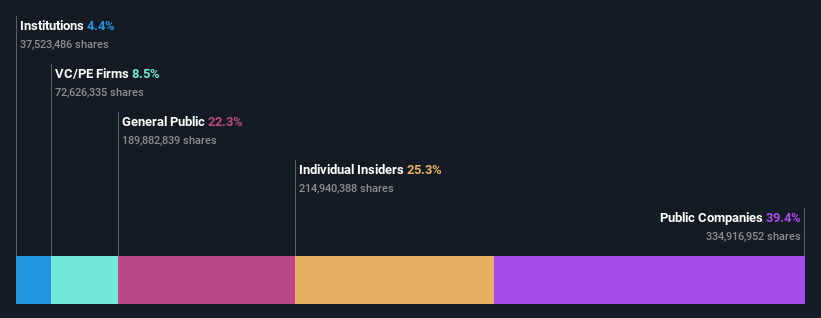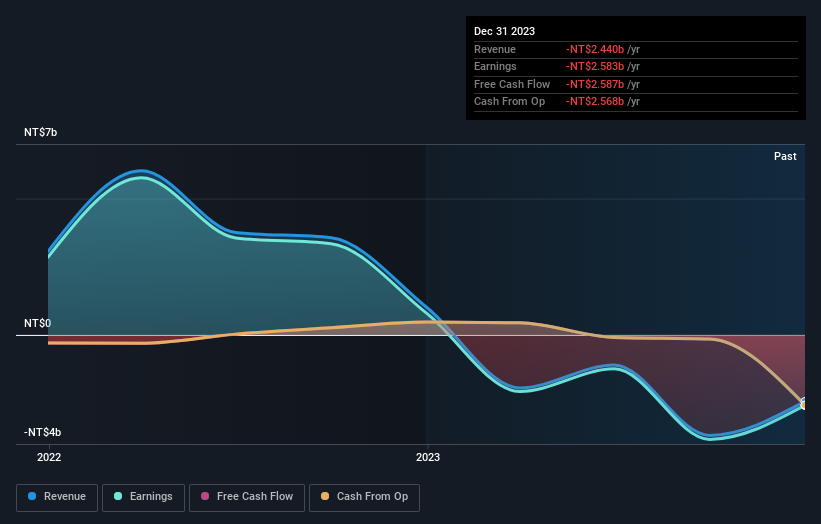Stock Analysis
- Taiwan
- /
- Capital Markets
- /
- TWSE:6901
Diamond Biofund Inc.'s (TWSE:6901) stock price dropped 4.8% last week; public companies would not be happy

Key Insights
- The considerable ownership by public companies in Diamond Biofund indicates that they collectively have a greater say in management and business strategy
- 52% of the business is held by the top 3 shareholders
- 25% of Diamond Biofund is held by insiders
If you want to know who really controls Diamond Biofund Inc. (TWSE:6901), then you'll have to look at the makeup of its share registry. We can see that public companies own the lion's share in the company with 39% ownership. Put another way, the group faces the maximum upside potential (or downside risk).
While insiders who own 25% came under pressure after market cap dropped to NT$35b last week,public companies took the most losses.
Let's take a closer look to see what the different types of shareholders can tell us about Diamond Biofund.
See our latest analysis for Diamond Biofund

What Does The Institutional Ownership Tell Us About Diamond Biofund?
Many institutions measure their performance against an index that approximates the local market. So they usually pay more attention to companies that are included in major indices.
Institutions have a very small stake in Diamond Biofund. That indicates that the company is on the radar of some funds, but it isn't particularly popular with professional investors at the moment. If the company is growing earnings, that may indicate that it is just beginning to catch the attention of these deep-pocketed investors. When multiple institutional investors want to buy shares, we often see a rising share price. The past revenue trajectory (shown below) can be an indication of future growth, but there are no guarantees.

Diamond Biofund is not owned by hedge funds. The company's largest shareholder is Microbio Co., Ltd., with ownership of 25%. With 14% and 13% of the shares outstanding respectively, Oneness Biotech Co., Ltd. and Ming-Hsing Tsai are the second and third largest shareholders.
After doing some more digging, we found that the top 3 shareholders collectively control more than half of the company's shares, implying that they have considerable power to influence the company's decisions.
Researching institutional ownership is a good way to gauge and filter a stock's expected performance. The same can be achieved by studying analyst sentiments. We're not picking up on any analyst coverage of the stock at the moment, so the company is unlikely to be widely held.
Insider Ownership Of Diamond Biofund
While the precise definition of an insider can be subjective, almost everyone considers board members to be insiders. The company management answer to the board and the latter should represent the interests of shareholders. Notably, sometimes top-level managers are on the board themselves.
Most consider insider ownership a positive because it can indicate the board is well aligned with other shareholders. However, on some occasions too much power is concentrated within this group.
It seems insiders own a significant proportion of Diamond Biofund Inc.. It is very interesting to see that insiders have a meaningful NT$8.8b stake in this NT$35b business. Most would say this shows a good degree of alignment with shareholders, especially in a company of this size. You can click here to see if those insiders have been buying or selling.
General Public Ownership
The general public, who are usually individual investors, hold a 22% stake in Diamond Biofund. This size of ownership, while considerable, may not be enough to change company policy if the decision is not in sync with other large shareholders.
Private Equity Ownership
With an ownership of 8.5%, private equity firms are in a position to play a role in shaping corporate strategy with a focus on value creation. Sometimes we see private equity stick around for the long term, but generally speaking they have a shorter investment horizon and -- as the name suggests -- don't invest in public companies much. After some time they may look to sell and redeploy capital elsewhere.
Public Company Ownership
It appears to us that public companies own 39% of Diamond Biofund. We can't be certain but it is quite possible this is a strategic stake. The businesses may be similar, or work together.
Next Steps:
It's always worth thinking about the different groups who own shares in a company. But to understand Diamond Biofund better, we need to consider many other factors. Take risks for example - Diamond Biofund has 3 warning signs (and 2 which can't be ignored) we think you should know about.
If you would prefer check out another company -- one with potentially superior financials -- then do not miss this free list of interesting companies, backed by strong financial data.
NB: Figures in this article are calculated using data from the last twelve months, which refer to the 12-month period ending on the last date of the month the financial statement is dated. This may not be consistent with full year annual report figures.
Valuation is complex, but we're helping make it simple.
Find out whether Diamond Biofund is potentially over or undervalued by checking out our comprehensive analysis, which includes fair value estimates, risks and warnings, dividends, insider transactions and financial health.
View the Free AnalysisHave feedback on this article? Concerned about the content? Get in touch with us directly. Alternatively, email editorial-team (at) simplywallst.com.
This article by Simply Wall St is general in nature. We provide commentary based on historical data and analyst forecasts only using an unbiased methodology and our articles are not intended to be financial advice. It does not constitute a recommendation to buy or sell any stock, and does not take account of your objectives, or your financial situation. We aim to bring you long-term focused analysis driven by fundamental data. Note that our analysis may not factor in the latest price-sensitive company announcements or qualitative material. Simply Wall St has no position in any stocks mentioned.
About TWSE:6901
Diamond Biofund
Diamond Biofund Inc. is a venture capital firm specializing in early venture, mid venture, late venture and growth capital investments.
Flawless balance sheet and overvalued.

